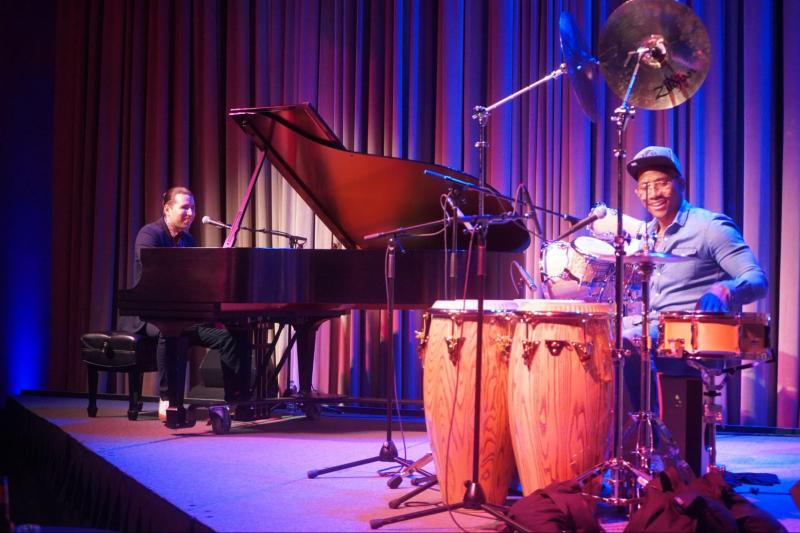Opening the concert with a euphonious fusion of classical piano and Afro-Cuban street-music-inspired drums, Havana-born artists Alfredo Rodríguez and Pedrito Martinez instantly captured the attention of all present in the Bing Concert Hall Studio on March 11.
Rodríguez and Martinez were warmly welcomed with a standing ovation at the conclusion of their first piece, setting the stage for their continually impressive performances throughout the night as well as the crowd’s enthusiasm to hear the dynamic duo perform at Stanford for the first time.
Both Rodríguez and Martinez are talented musicians in their own right, each garnering a Grammy Award nomination for their respective musical endeavors. But these two Cuban powerhouses coalesce their unique sounds with a mesmerizing chemistry, with Rodríguez’s piano prowess synergizing with Martinez’s expert drum playing. The musical duo briefly performed together in concert as early as 2013, yet their work wasn’t truly given the opportunity to reach its full potential and flourish until the release of their most recent collaboration, “Duologue,” in 2019.
Rodríguez and Martinez perfectly complemented each other in both energy and sound as they performed excerpts from the joint album, cheering each other on as their individual performances enhanced each other’s. Martinez’s percussion accentuated Rodríguez’s cascading melodies, adding rhythmic emphasis to songs by tapping lightly on the cymbal or drumming with the speed and sound of lightning and thunder.
At one point, during one of Rodríguez’ many piano solos (some of which lasted upwards of nine minutes), Martinez approached Rodríguez’ bench to video record his performance, egging his partner to play faster, animating the stage with his enthusiasm and further rousing the crowd with a series of sprightly dance moves.
The Cuban duo’s work skillfully showcases and incorporates a myriad of diverse influences and cultures, from the distinctive drumming native to the streets of Havana to Rodríguez’s intentionally retro-sounding staccato piano playing in the “Duologue” track “Super Mario Bros. 3.”
Armed with only rhythm, tempo and sound as their tools, the duo painted a wide spectrum of emotions as they immersed the audience in an emotional kaleidoscope, seamlessly transitioning between songs of longing and upbeat fusion tunes, like their folkloric, reggae and Cuban-inspired cover of Michael Jackson’s “Thriller.”
With a fast tempo and aggressively fortissimo notes paired with a seemingly endless crescendo that threatened to wake Stanford residents all the way in EVGR, some songs are full of liveliness and mirth. Yet, with a gradual decrescendo and slowing tempo, Rodriguez seamlessly transitioned from these vibrant songs into subsequent performances of wistful and nostalgic lullabies and memoirs, like a lover lamenting the loss of a relationship under a waning moon, wondering where it all went wrong.
In the Havana artists’ back-to-back performances of “Tocororo” (named after the Cuban national bird) and “Yo Volveré,” Rodríguez and Martinez shared personal stories detailing their yearning to someday return home to Cuba, following their 13 and 20-year absences, respectively.
Rodríguez and Martinez explained that these songs elicit memories of childhood, teachers and friends –– and they dedicate these songs, in particular, to all immigrants in the whole world who long to return home.
Rodríguez’s emotions became tangible as he sang over the bittersweet tracks. The piano chords flowed in a rush of flooding emotions, and Martinez’s barely audible pitter-patter on the drums sounded like rainfall on Havana streets.
In one of their final songs, an artistic rendition of “Quizas, Quizas, Quizas,” a famous Cuban song originally written and sung by Osvaldo Farrés, Martinez engaged the audience, starting a loud rhythmic chant of “Quizas, quizas, quizas.”
As the song reached its conclusion, Martinez skillfully directed the crowd, gradually quieting his drums and lowering the chant into a haunting whisper until nothing remained but the lingering notes of the piano. And then — silence.
Editor’s Note: This article is a review and contains subjective opinions, thoughts and critiques.
